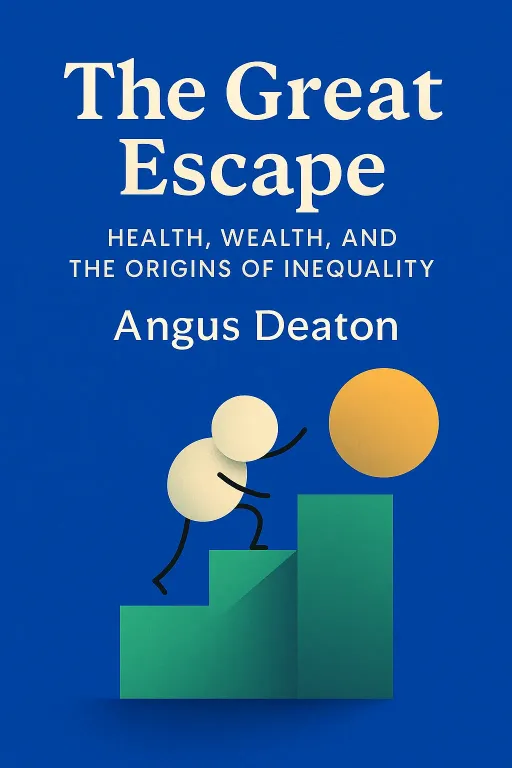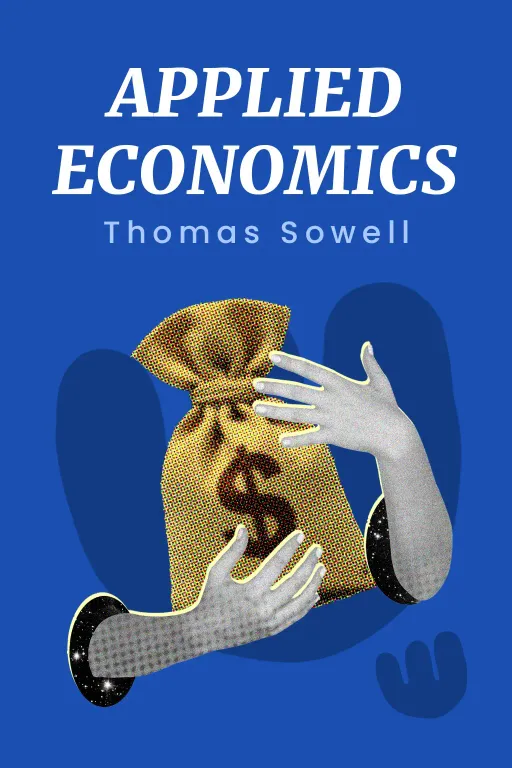
The Great Escape
10 minHealth, Wealth, and the Origins of Inequality
Introduction
Narrator: Imagine a young man born in a bleak English coal-mining village in 1918. His future seems set: a life of hard labor in the pits, with limited education and the constant threat of poor health. Yet, through a combination of luck, determination, and the changing tides of history, this man, Leslie Deaton, escapes. He survives World War II, qualifies as a civil engineer, and provides his children with opportunities he never had. This personal story is a microcosm of a much larger, more complex narrative about humanity itself. In his book, The Great Escape: Health, Wealth, and the Origins of Inequality, Nobel laureate Angus Deaton uses this powerful metaphor to explore the incredible progress humanity has made in escaping deprivation and early death, while simultaneously exposing the stark inequalities this very progress has created. The book is a sweeping examination of the endless, often fraught, dance between human advancement and the disparities that trail in its wake.
Progress is the Engine of Inequality
Key Insight 1
Narrator: Deaton’s central argument is that progress and inequality are not opposing forces; they are deeply intertwined. Progress, by its nature, does not happen everywhere at once. It begins in one place, with one group, and only later do its benefits spread. This initial spark of advancement inevitably creates a gap between those who benefit first and those who are left behind.
The most dramatic example of this is the Industrial Revolution. Before the 18th century, most of the world lived in similar conditions of subsistence poverty. But when Britain began to industrialize, it ignited a period of unprecedented economic growth. This created what historians call the "Great Divergence"—a massive chasm in wealth between the newly industrialized West and the rest of the world. Britain, and later Europe and North America, pulled away, creating the global income inequalities that persist today. This wasn't necessarily a story of exploitation in its initial phase, but one of uneven progress. The engine of growth that lifted some nations to prosperity was the very same engine that forged the gap between the world's rich and poor. This pattern repeats itself not just with wealth, but with health, as new knowledge and technologies often reach the educated and affluent long before they benefit everyone else.
The Escape is Measured in Years of Life, Not Just Dollars
Key Insight 2
Narrator: While economic growth is a critical part of the story, Deaton insists that a true measure of wellbeing must include health and longevity. The escape from early death is perhaps the most fundamental escape of all. For most of human history, life was brutally short. In 1900, life expectancy in the United States was only 47 years. Today, it is around 80. This incredible thirty-year gain is a monumental achievement.
However, just like wealth, this progress has been uneven. Deaton points to 18th-century England, where the aristocracy and the general population had similar, and similarly low, life expectancies. Both were equally vulnerable to infectious diseases. But around 1750, something changed. The aristocracy, embracing Enlightenment ideas and new practices like smallpox variolation, saw their life expectancies begin to climb, pulling away from the common people. This created a new kind of inequality—a health gradient. This divergence was a leading indicator of the broader public health improvements that would follow. The ultimate success story of this escape is the global eradication of smallpox, a disease that once plagued humanity. This achievement demonstrates the immense power of knowledge and international cooperation to conquer disease and dramatically improve human wellbeing.
Knowledge, Not Just Income, is the Key to Health
Key Insight 3
Narrator: If progress creates inequality, what drives progress itself? Deaton argues that the ultimate engine is not money, but knowledge. The most powerful illustration of this is the development of the germ theory of disease in the 19th century. Before this breakthrough, cities were death traps. In London, cholera epidemics were rampant, and the prevailing "miasma theory" blamed bad air.
Then, in 1854, a physician named John Snow conducted a brilliant investigation. During a severe cholera outbreak, he meticulously mapped the locations of deaths and traced the source to a single contaminated water pump on Broad Street. By removing the pump handle, he stopped the outbreak. Snow’s work was a crucial piece of evidence for the then-radical idea that tiny, invisible organisms—germs—were the true culprits. Once the germ theory was accepted, it revolutionized public health. It led to the understanding that clean water, sanitation, and hygiene were not just pleasantries but matters of life and death. This knowledge, more than any increase in income, was responsible for the dramatic decline in child mortality and the surge in life expectancy at the end of the 19th century.
The Illusion of Foreign Aid
Key Insight 4
Narrator: Given the vast inequalities in the world, a natural response from wealthy nations is to provide aid. However, Deaton delivers a sharp critique of the modern foreign aid system, arguing that it is often ineffective and can be actively harmful. He calls the belief that poverty can be solved by simply transferring money from rich countries to poor countries the "aid illusion."
The problem is that most aid is not a simple transaction from a rich person to a poor person. It is a transfer from a rich government to a poor government. This dynamic can be toxic. Deaton provides the example of Zaire under the dictator Mobutu Sese Seko. For decades, Western powers poured aid into Zaire, not to help its people, but to keep Mobutu as a Cold War ally. The aid propped up his corrupt regime, allowed him to ignore the needs of his citizens, and ultimately left the country in ruins. Large aid flows can sever the essential link between a government and its people. When a government doesn't need to tax its citizens to function, it has little incentive to listen to them or provide services, leading to a breakdown of accountability and institutional capacity.
How We Measure Progress Shapes Our Reality
Key Insight 5
Narrator: Throughout the book, Deaton emphasizes that our understanding of wellbeing is shaped by how we choose to measure it—and these measurements are often flawed and political. GDP, for instance, is a poor proxy for wellbeing. It counts "defensive expenditures" like building prisons and ignores valuable non-market work, like caring for a family.
The official poverty line in the United States provides another stark example. It was created in the 1960s by an economist named Mollie Orshansky, who calculated the cost of a bare-bones "economy food plan" and multiplied it by three. This line has only been adjusted for inflation since, never for the rising standard of living. As a result, it defines poverty in 21st-century America by 1960s standards, making the poor seem less poor than they are relative to the rest of society. Furthermore, the official measure uses pre-tax income and excludes the value of government assistance like food stamps. This means that the very programs designed to fight poverty are not counted when measuring it, creating a distorted picture that can paralyze effective policymaking.
Conclusion
Narrator: The single most important takeaway from The Great Escape is that progress and inequality are two sides of the same coin. Humanity's escape from deprivation is a story of triumph, but it is a story that has left billions behind and created new, cavernous divides. The greatest threat is not progress itself, but when those who have already escaped use their power to "destroy the escape routes behind them," protecting their own positions and blocking opportunities for others.
Deaton’s work challenges us to rethink our role in the world. He urges us to move beyond the simple, and often flawed, question of "How can we help?" and instead ask a much harder one: "What are we doing that is hurting them?" This forces a shift in focus from foreign aid to the more complex and uncomfortable realities of our own trade policies, arms sales, and migration restrictions. The great escape continues, but ensuring it is a journey available to all remains the most profound challenge of our time.









